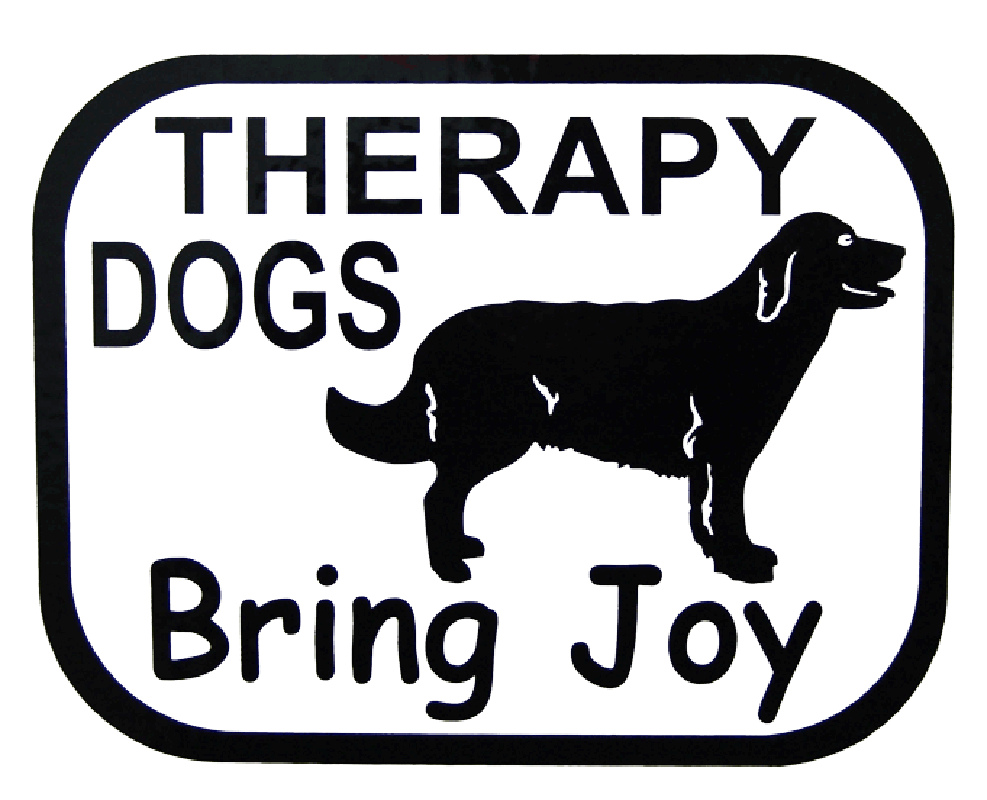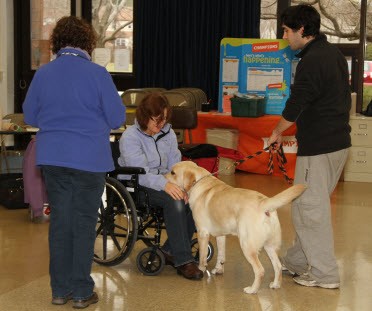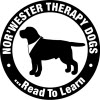CAN MY DOG BECOME A THERAPY DOG?

One of the most frequent questions we get is from owners who want to know how they can get their dog certified to work as a registered therapy dog.
We have learned over the years that the most important thing is a well socialized dog. Proper socialization creates a relaxed, confident, well-adjusted, and happy canine, one that is comfortable in a wide variety of environments. Socialization does not just happen; it takes a serious commitment on the part of the owner to expose the dog regularly to traveling in the car, interacting with people of all ages, other dogs, and to strange sights and sounds.
It is strongly recommended that socialization be done in 5 different venues per week. Some prime locations for socializing dogs are outdoor malls, flea markets, sporting events, walking in towns like Newtown or Doylestown, canine training classes, pet stores, Peddler’s Village, and at the entrance to high traffic places like Rita’s Water Ice and grocery stores. Use your imagination, but always be safe!
It is important to reinforce and emphasize good manners while socializing your dog. The owner needs to separate dog socialization from working socialization. While you are exposing your dog to different environments, remember to insist that your dog walk past another dog calmly and/or sit by your side while in the presence of another dog. This will make it easier when you navigate this portion of the therapy dog test as well as when you work in group therapy visits. Dogs should learn to walk on a loose leash and not be allowed to jump on people. Even small dogs should not be allowed to jump on people.
Therapy dogs destined to work in schools should be comfortable and confident with children. Likewise, therapy dogs who will be working in nursing homes and hospitals should be gentle with the elderly and ill, and unafraid of medical equipment and assistive devices.
Some of the environments and situations where therapy dogs work includes schools, college campuses, hospitals, nursing homes, with war veterans, hospice, and crisis intervention. Therapy dogs also visit public libraries, special needs camps, and community groups such as the Girl Scouts.
The Nor’wester Therapy Dogs organization requires our handlers to complete the American Kennel Club’s Canine Good Citizen (CGC) certification https://www.akc.org/products-services/training-programs/canine-good-citizen/training-testing/ as part of their dog’s preparation for therapy dog testing.
If you feel your dog is ready for the CGC test, some local testers are listed at https://norwestertherapydogs.org/get-involved/therapy-dog-certification/ for your convenience. In addition, CGC testing is often available at AKC sanctioned dog shows and through local dog training organizations. There is no age restriction for CGC testing.
Many dog training organizations offer therapy dog classes prior to testing. These classes are often helpful for novice dog handlers because they offer guidance in preparation for testing and for working as a therapy dog. However, classes are not required. If an experienced owner feels his/her dog is ready, arrangements can be made with a therapy dog organization or evaluator to have the dog tested. It is important to understand that the test is as much an evaluation of the handler as it is the dog, and the pair are certified as a team.
On some therapy dog organization websites, you can review the test used by that respective organization. Dogs are required to be at least one year old before they are eligible to be tested. If an adult dog is adopted, then that dog may not test until it has been owned by the handler for a minimum of 6 months.
The two main therapy dog organizations which most of our handlers test with are:
Alliance of Therapy Dogs: https://www.therapydogs.com/
Bright & Beautiful Therapy Dogs: http://www.golden-dogs.org/
Starting socialization and training is easier with puppies, but many owners adopt adult dogs who are sometimes suitable candidates for therapy dog work. Because it is likely the past socialization/training history of the dog is unknown, it is recommended that owners diligently socialize and train the same as they would with a puppy. Enrolling in obedience classes is always a great way to get a good feel for the temperament of an adopted adult canine.
It is extremely rewarding to prepare your dog for therapy dog testing. The time spent socializing and training strengthens your bond and enhances your effectiveness as a therapy dog team. The Nor’wester Therapy Dogs organization is always available to answer any questions you may have.




